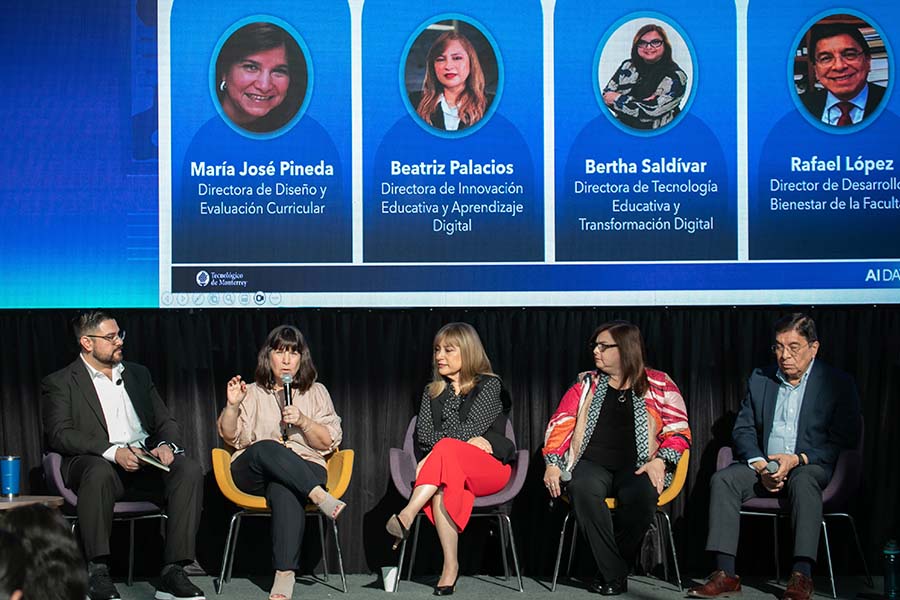Tec de Monterrey professors explained how they have been using generative artificial intelligence to improve their teaching methods, customize student experiences, and optimize their time.
During AI Day 2025, Tec professors presented success stories achieved with Skill Studio , a TECgpt ecosystem platform that makes it possible to generate sophisticated and reusable prompts (skills) to automate academic content creation.
Manuel Terán, manager of Artificial Intelligence Platforms at the Tec, defined this platform as “a sophisticated prompt that gives a different result when you change input parameters, which makes it possible to reuse and share it,” headded.
The academics listed advantages such as saving time and improved organization, agreeing that generative AI does not replace the role of teachers.
CONECTA shares six academic success stories of Tec professors.

1. Automated design generation
Marcos Montemayor, a professor at the School of Architecture, Art, and Design, presented his experience of using generative AI to design digital art training units.
As the design leader of the “Animated Short Film” block, he emphasized that the Skill Studio tool allowed him to structure his ideas more efficiently and save time when carrying out his academic activities.
According to Montemayor, the principal advantage of Skill Studio was that “it saves us time when structuring our ideas” and facilitates the organization of educational content pursuant to Tec guidelines.
Personally, he mainly used the “design an evaluable activity” function, which enabled him to automate the creation of exercises aligned with learning objectives.
He also stressed that AI does not replace the work of the teacher, but rather “helps to structure and speak the Tec language,” ensuring that activities meet institutional standards.
For Montemayor, AI is a great ally in creative and educational contexts as it allows processes to be optimized and activities to be generated more quickly.
He stressed how essential it is that: “teachers should continue to be the ones who provide the human and pedagogical touch to materials generated by artificial intelligence.”

2. Customized learning with AI
Sara Hernandez, a professor in the School of Humanities and Education, talked about her experience of using generative AI to design the “Emerging Pedagogies” training unit.
She explained that she first turned to TECgpt to generate ideas and then used Skill Studio to structure and organize activities pursuant to educational standards.
The main benefits she discovered included being able to tailor her activities to students and optimize design times.
To quote Ms. Hernandez, “we were able to finish a process that could have taken weeks in a matter of days,” allowing her to focus on other key aspects of the course.
She also pointed out how AI makes it easier to structure tasks and assessments, and gave examples of literature review and different pedagogical approaches to activities.
For her, AI is a tool that “opens our minds and allows us to be more efficient,” but she explained that its use should complement and not substitute creativity or teacher judgment.

3. Virtual assistants for real-time feedback
Xitlally Rivero, national director of the Bachelor of Arts in Hispanic Literature (LLE) program at the School of Humanities and Education, addressed the impact of AI on virtual tutoring and academic feedback.
Rivero explained that teachers often face time constraints on the provision of detailed feedback to each student and that AI can be a great ally in this regard.
She explained that AI can be useful for generating evaluation instruments, thereby optimizing the time teachers spend creating rubrics and quizzes.
Furthermore, she discussed the possibility of using AI to create virtual tutoring environments where students’ concerns can receive immediate attention.
“Teachers can use TECgpt to analyze student performance and provide personalized feedback in real time, which enhances the learning experience and reduces the administrative workload.”
For Rivero, the true potential of AI lies in its ability to “offer new perspectives and help us optimize our time without losing control over our teaching practices.”

4. Automated generation of reading quiz questions
Jorge Cruz Ángeles, a professor in the School of Engineering and Sciences, explained how he used Skill Studio to improve evaluation of his students with reading quizzes.
As a teacher of technical subjects, he noted that the tool allows him to generate questions in a more efficient and automated way, ensuring greater coverage of key topics in his courses.
According to Cruz Ángeles, “AI helps generate questions aligned with learning objectives quickly,” thereby optimizing the evaluation process and reducing the time needed to construct exams.
He personally favored the automatic quiz creation function, which allowed him to generate a variety of questions tailored to the different levels of complexity required in his classes.
For Cruz Ángeles, Skill Studio is a valuable ally for teachers as it allows them to focus more time on providing feedback and analyzing results instead of generating questions manually.

5. Assisted interpretation of statistical data in market research
Delia Pérez, a professor at the School of Business, gave a presentation explaining how she used Skill Studio to make better interpretations of statistical data in market research.
As an expert in data analysis, she explained that the tool enabled her to develop a skill specifically designed to help students transform numbers into meaningful insights.
In her experience, “it affords students easier access to data and helps them understand and apply them,” thereby facilitating its use as a decision-making tool in business settings.
Pérez personally used the automated data analysis function, which enabled her to generate structured interpretations of trends and correlations to gain a better understanding of the impact of the results on businesses.
She also stressed that AI is not a substitute for critical reasoning, but “a tool that supports learning by providing students with guidance on how to interpret information.”
For Pérez, Skill Studio is a key resource for training future market analysts and strategists as it streamlines data processing and allows them to focus on informed decision making.

6. Customizing analysis of sustainability reports
Ana Catalina Treviño, a professor at the School of Business, commented how Skill Studio has enabled her to contextualize learning better by tailoring the analysis of sustainability reports according to company and academic period.
According to Treviño, the greatest advantage of this technology is that “it makes it possible to customize sustainability exercises to individual business contexts and facilitates a more realistic learning experience.”
Treviño personally used the content customization function, which enabled her to tailor case studies and assessment metrics to the specific needs of each group of students.
She also stressed that artificial intelligence does not replace traditional teaching, but “helps make data analysis dynamicand provides students with more relevant examples.”
For Treviño, Skill Studio is an innovative tool for teaching sustainability as it enables greater content adaptation and promotes learning based on updated data.
Benefits of AI in education
The benefits of AI in education were also discussed on the “Incorporating AI into syllabuses” panel moderated by Irving Hidrogo, Director of Educational AI at the Tec.
The following key points were addressed:
Efficiency and automation: Teachers can optimize their time by delegating repetitive tasks to AI.
Customized learning: The adaptability of AI allows individual student needs to be addressed.
Accessibility: AI facilitates access to educational materials and academic support at any time.
Increased interaction: Simulations and virtual assistants encourage active learning.
“Artificial intelligence doesn’t save us time on things that are not important, but it allows us to do important things in a short time.”- Rafael López
Challenges and considerations
Challenges to the implementation of AI in education were also addressed by the panel:
Ethics and plagiarism: Ensure that students use AI responsibly and not for cheating.
Teacher training: Prepare teachers to take full advantage of this technology.
Equal access: Ensure that all learners have equal opportunities to benefit from AI.
Information reliability: Verify that AI-generated content is accurate and high quality.
The panel comprised:
- María José Pineda, Director of Curricular Design and Evaluation
- Beatriz Palacios, Director of Educational Innovation and Digital Learning
- Bertha Saldívar, Director of Educational Technology and Digital Transformation
- Rafael López, Director of Faculty Development and Wellbeing

Tec incorporates AI into its syllabuses
Also discussed during AI Day was the integration of artificial intelligence (AI) into the Tec’s 2026 syllabuses with the goal of training professionals to take on the challenges of the digital era.
María José Pineda, Director of Curriculum Design and Evaluation, explained that ensuring competent graduate profiles is the primary concern.
“We can’t imagine a future without AI in education and professional training.”
One of the central pillars of this transformation is keeping the teacher at the center of the teaching process.
According to Rafael Lopez, Director of Faculty Development and Wellbeing, “Artificial intelligence doesn’t save time on things that are not important, but it enables us to do important things in a short time.”
He also underscored that AI does not seek to replace teachers, but rather to support their work with tools that optimize their time and maximize their impact on students.
Beatriz Palacios, Director of Educational Innovation and Digital Learning, explained that the Tec is working on generating a safe environment for teachers to experiment with AI.
“We want professors to feel supported, to have confidence and access to the technological tools they need for their teaching practice.”
This implies having not only access to state-of-the-art tools but also training and support on how to put them into practice.
“At no point does the use of artificial intelligence imply automating a teaching process that takes the human factor out of the equation because empathy generates a change in the cognitive process of learning,” asserted Palacios.
Syllabuses are currently being drawn up for 2026 with the intention of integrating AI as a key principle of the educational process.
What is Skill Studio?
The second phase of the TECgpt project, which as a whole has been named the TECgpt Ecosystem, was presented during AI Day.
This ecosystem includes the TECgpt Portal, a platform that features Skill Studio and Agent Studio, which is designed for teachers, researchers and collaborators to generate automated skills that optimize their productivity.
Terán explained how Skill Studio is a platform that supports the generation of sophisticated and reusable prompts(skills) focused on the completion of a specific task by sending instructions to the internal generative AI model.
“It’s a sophisticated prompt packaged in a mini application. When you run it, you change the input parameters and it gives you a different result, which makes it possible to reuse and share it,” he added.
In addition to increasing the number of people using this tool, Terán mentioned that each skill is capable of:
- Reading files.
- Extracting URL content.
- Doing internet searches.
- Converting text to speech.
- Selecting the creativity level.
“When the skill has been created, its owner can share skills by email or in groups with read or write permissions and even post it on the TECgpt Portal. Skills may also be certified by groups of syllabus experts.
“Skill Studio is constantly evolving, and new features are regularly added to ensure that the tool remains relevant and useful and can provide common feedback to users,” said Terán.
AI Day 2025
Tecnológico de Monterrey’s Digital Transformation department organized the second AI Day to promote the responsible use of AI in education and to stimulate research in the field.
This event was held on March 28 in the lobby of the Luis Elizondo Auditorium in Monterrey.
Carles Abarca, Vice President of Digital Transformation, took advantage of the occasion to mention that Tec de Monterrey has been a pioneer in the adoption and development of world-transforming technologies.
“Today, artificial intelligence is not just a topic of conversation, but a driver of global change.
“This progress reflects our constant search for innovation, which has made it possible to bridge the gap from experimentation to production with thousands of users and real-world applications which demonstrate that AI is a key tool for the future,” said Abarca.
YOU MAY ALSO BE INTERESTED IN:





